Keresés: %s
Keresés: %s
Hungary calling for the establishment of a UN intergovernmental Body on Water
As a representative of Hungary, organizer of the Budapest Water Summit 2016, Mr. Ádám Zoltán Kovács, Deputy Secretary of State for international cooperation addressed today the audience of a side event discussing the issues of water and sanitation held in the framework of the High-Level Political Forum on Sustainable Development at the United Nations. Mr. Kovács reiterated that the establishment of a UN intergovernmental Body on Water stands at the core of improved water architecture in order to enable regular dialogue among governments and major groups at the global level, providing guidance and recommendations for implementation of the SDG targets related to water. The event on „Tracking progress to ensure no-one is left behind – contributing to follow-up and review of the water, sanitation and hygiene target of the SDGs” was organized by the international NGO, Sanitation and Water for All (SWA), co-hosted by the Permanent Missions of Portugal and Ethiopia.
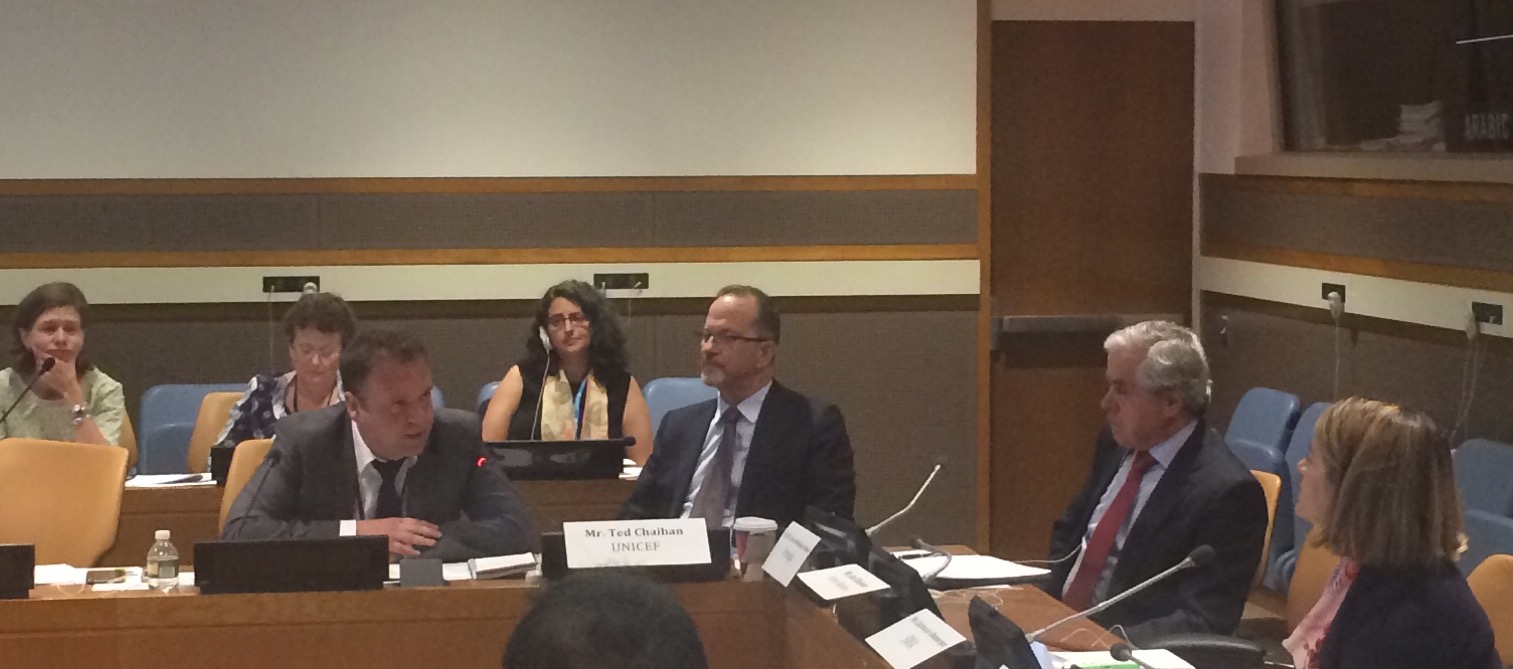
Hungary supports an efficient and transparent UN Security Council
The Security Council held an open debate on 19 July 2016 focusing on the working methods of the Council. The debate, held under the Presidency of Japan, focused on reviewing the progress made to date in this area by taking into account the views of the wider UN membership. Ambassador Katalin Bogyay, Permanent Representative of Hungary to the United Nations highlighted the importance of an efficient and transparent Council which is the shared responsibility of the international community.
In his introductory statement, the President of the Security Council, Ambassador Koro Bessho highlighted that enhancing transparency and inclusiveness of the working methods of the Council is crucial for its effective functioning. In all these areas, the Security Council has made a steady progress during the last decade but there is room for significant further improvement. The debate serves the purpose of hearing the voices of the wider UN membership on this topic.
In her statement, Ambassador Bogyay underlined that Hungary supports all measures enhancing transparency and effectiveness of the work of the Security Council including those which further strengthen the relationship between the Council and the General Assembly. Hungary welcomes General Assembly resolution 69/32 which has set a structured process for the selection of the next Secretary-General and we look forward to a more transparent process during the next phase (straw polls) as well.
Ambassador Bogyay emphasized that Hungary advocates for refraining voluntarily from the use of veto in cases of mass atrocities and encourages all Member States who have not yet done so to support the Code of Conduct elaborated by the ACT Group and signed by 112 Member States to date. She added that the Security Council should utilize its power to refer cases to the International Criminal Court (ICC) in a consistent manner, whenever it is necessary.
To read the full statement of the Ambassador, please click here.
At the High-Level Political Forum Hungary reiterates strong commitment to contributing to the global effort aimed at the implementation of the 2030 Agenda on Sustainable Development
Participating at the ministerial segment of the High-Level Political Forum on Sustainable Development, Mr. Ádám Zoltán Kovács, Deputy Secretary of State for international cooperation reiterated Hungary’s strong commitment to actively contribute to the effective implementation of the SDGs and the Paris Climate Agreement. Convinced that the implementation of SDG6 (“Ensure availability and sustainable management of water and sanitation for all”) is both a crucial driver and enabler for the realization of sustainable development, Hungary continues to play a leading role in promoting the global water agenda.
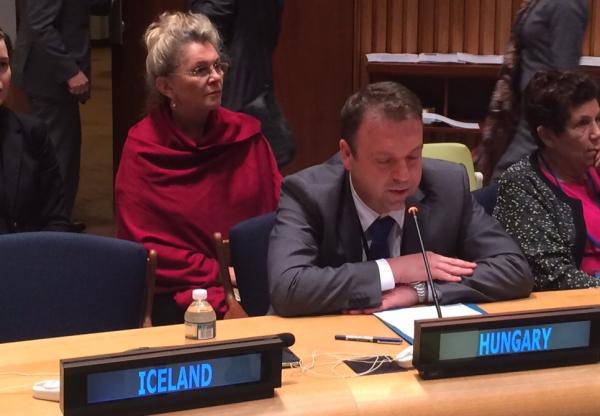
In the general debate Ádám Zoltán Kovács, Deputy Secretary of State for international cooperation underlined that the Sustainable Development goals and the Paris Climate Agreement can only be realized if pursued in a coherent, mutually reinforcing manner. Mindful of the need for an early and decisive climate action, Hungary has not only signed the Paris Agreement on the 22 April in New York, but the Hungarian Parliament also approved the agreement’s ratification with a unanimous vote on 24 May. Deputy Secretary of State Kovács urged big emitters to follow suit.
While ready to continue the active role on the global level Hungary was playing during the creation of the SDGs as co-chair of the Open Working Group on Sustainable Development, our country has also started to develop its own framework of implementation in collaboration with the responsible ministries and other bodies, the national statistical office and all the stakeholders with the aim of integrating the 2030 Agenda into national development plans and strategies.
To further contribute to the shared goals of the international community, Hungary is taking an extraordinary commitment regarding the water-related issues in the world. To realize the transformative and integrated Agenda 2030 vision of water, Hungary is of the view that the reform of the highly fragmented global water governance structure is indispensable. The establishment of a UN intergovernmental Body on Water stands at the core of improved water architecture in order to enable regular dialogue among governments and major groups at the global level, providing guidance and recommendations for implementation of the SDG targets related to water.
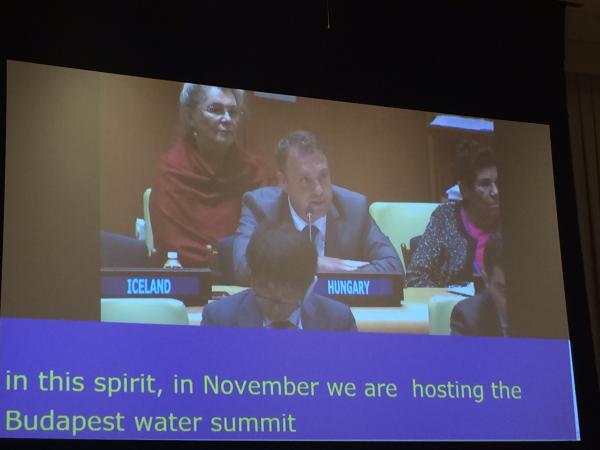
To give momentum to the implementation of the water-related agenda transpiring from SDGs and the Paris Climate Agreement and to seek to link political decision-making closer to technology development, financing and public perceptions on sustainable water management, Hungary is hosting the Budapest Water Summit 2016 from 28 to 30 November 2016.
On the margins of the HLPF Deputy Secretary of State Kovács actively engages in numerous side events, including UNEP’s High-level dialogue on achieving environmental sustainability for sustainable development, the event entitled “Tracking progress to ensure no-one is left behind – contributing to follow-up and review of the water, sanitation and hygiene target of the SDGs” and an event on “A renewed European development policy in response to the UN 2030 Agenda: Revision of the European Consensus on Development”.
Hungary in the UN
Our world, our future, our responsibility.
The Permanent Mission of Hungary to the United Nations is tasked to actively participate in fulfilling the goals and principles of the United Nations, while promoting the national position of Hungary, and to advise national authorities on the developments in the international arena.
The Permanent Mission acts in the spirit of dialogue, openness, inclusivity and bridge-building, with due respect for others’ positions, in search of long term, principled win-win solutions for the universal issues related to peace, security, social and economic development and human rights.
While Hungary is fully committed to fulfilling all obligations and goals of the United Nations, it puts particular emphasis to the following foreign policy priorities:
Working for a better United Nations: Hungary seeks to create a more responsive, effective, efficient and credible United Nations and therefore fully support the reform efforts of Secretary General Guterres. We welcome the initiatives to modernize, simplify and restructure the UN bureaucracy and its main substantive pillars. The UN needs to become more efficient, more relevant and more responsive to emerging challenges and needs, stemming from the implementation of the 2030 Agenda. Hungary stands for better results through increased coordination, transparency and accountability.
Strengthening preventive diplomacy as well as building trust and reconciliation: Hungary is strong advocate of preventive diplomacy, mediation and „putting peace first” in today’s complex security contexts. We are particularly encouraged by the dedication of Secretary-General Guterres to make the UN more fit for the peace and security challenges of our time also by integrating prevention into the three pillars of the work of the organization as well as enhancing the coherence of activities of the UN in this field.
Promoting and protecting human rights: Sustainable development can only be achieved for the people and by the people, through full economic, social and political inclusion. This requires the promotion and protection of human rights and fundamental freedoms, with a particular focus on vulnerable groups.
For historical and moral reasons, the international protection and promotion of minority rights - especially the rights of persons belonging to national, religious and ethnic minorities - is one of the main objectives of the Hungarian foreign policy. We are convinced that violating ethnic, religious, racial or linguistic freedoms poses a great risk on future of societies. Hungary is contributing to the effectiveness of the Human Rights Council and its mechanisms, notwithstanding through leading and sponsoring initiatives in its national capacity and as a member of the European Union. Hungary works towards de-politicising the work of the Council, stepping up efforts to re-build confidence among members and seeks for a consensual track.
Protection of religious minorities (with special attention to Christians) in conflict: Hungary is firmly committed to the promotion and protection of minorities, including religious minorities, with special regard to Christians, as well as to the accountability of any criminal offences against them. We are deeply concerned by the persecution of Christians in the Middle East, and are convinced that the protection of ethnic and religious pluralism is crucial for the long-term stability and security of the region. We have to ensure accountability for perpetrators, and Hungary actively supports national and international efforts in this regard.
Gender equality / Women’s empowerment: Hungary is a strong supporter of efforts aimed at providing equal rights and empowering women in all educational, economic, financial, judicial and social processes, as a key to global progress. We promote women’s engagement in local, national, and global decision-making structures, including electoral processes.
We stand firm in fighting violence against women, including sexual violence in conflict situations, sexual exploitation and abuse, with special regard to sexual violence in conflict. We have to break down gender stereotypes, and enable all women and girls to reach their full potential within and beyond the UN, including in science and the STEM sector. The inclusion of women in preventive diplomacy, conflict prevention and resolution, post-conflict peacebuilding and reconciliation should be fully used. Sustainable peace, prosperity and the respect for human rights can only be achieved with women’s meaningful participation in all levels of decision-making, and long-term economic empowerment.
Fight against modern slavery: We work towards achieving the various SDG targets aimed at eradicating modern slavery, human trafficking, forced labor, in particular when it targets women, children, religious or ethnic minorities. In this context, Hungary calls for strengthening UN response, including through enhanced international cooperation, close partnership, and strong leadership. We believe in a human rights and survivor-centered as well as an exploitation type-specific approach to human trafficking that is based on the protection of survivors, with a special focus on women and children.
Actively participating in the maintenance of peace and security: Supporting the Security Council as the ultimate body responsible for maintaining international peace and security. Hungary supports comprehensive Security Council reform and enlargement efforts aimed at reflecting the realities of the 21st century. More than ever we all need a strong and representative Council which continues to play the decisive role in preserving peace and security on the globe. Hungary also focuses on improving the working methods of the Security Council and its interaction with other organs within and outside the UN. As an active and founding member of the ACT (Accountability, Coherence, Transparency) Group, Hungary advocates all efforts aimed at making the Security Council more efficient, inclusive and legitimate. We took active part in the elaboration of and continue to promote the ACT Code of Conduct regarding Security Council action against genocide, crimes against humanity and war crimes.
Hungary contributes to UN peace operations meaningfully, and currently has troops and policemen in Lebanon, Western Sahara, Cyprus and Kosovo. Hungary supports the peacekeeping reform efforts, including its better linkage with peacebuilding, with special focus on building inclusive societies, education, protection of culture and human rights. It is currently under consideration, how Hungary could deploy a new contingent to a UN peacekeeping operation. We seek further opportunities to boost police presence in UN peace operations as well.
We strongly committed to identify, nominate and deploy female military experts and police officers to UN peacekeeping and EU CSDP missions, as women’s participation in UN peace and security efforts, including post-conflict governance and peacekeeping are essential to achieve mission mandates and to foster the creation of peaceful and inclusive societies.
Hungary remains active in the field of arms control, disarmament and non-proliferation. Every year we submit the resolution on the Convention on the Prohibition of the Development, Production and Stockpiling of Bacteriological (Biological) and Toxin Weapons and Their Destruction, as its sole sponsor, and so far it has always been adopted by consensus.
We share the view that the spread of violent extremism and terrorism requires improved coordination among the numerous UN entities mandated to deal with specific aspects of these phenomena. For these reasons, Hungary, as an active and long-time supporter of counter-terrorism and fighting violent-extremism, welcomes the architectural reforms of counter-terrorism forces of the UN and the establishment of the Office of Counter-Terrorism. The most recent indication of that was the organization of a Regional Conference under the theme “Prevention of Radicalization to Terrorism: Regional Policy Responses and Risk Mitigation”, which was convened in Budapest on 7-8 November, 2019. The Conference brought together over 200 participants from 61 Member States as well as international, regional and civil society organizations who examined strategies addressing the conditions conducive to the spread of violent extremism. It is also worth mentioning that the Host Country Agreement of the UN Programme Support Office in Budapest was ratified at the conference. That brings the UNOCT into the family of UN entities present in Budapest.
Ensuring accountability: Understanding the mutually reinforcing correlation between peace, security and accountability, Hungary supports ensuring criminal justice for atrocity crimes. Therefore, Hungary provided political and financial support to the International Impartial and Independent Mechanism (IIIM) set up to assist in the investigation and prosecution of persons responsible for the most serious crimes under international law committed in the Syrian Arab Republic.
Turning words into action in Sustainable Development: Hungary is determined to take its share of responsibility in delivering on our common transformative commitments enshrined in the 2030 Agenda for Sustainable Development and the Paris Climate Agreement. We are working together with partners towards the full operationalization of the system-wide efforts and activities of the UN charting a path towards sustainable development. Only sustainable development, the comprehensive implementation of the 2030 Agenda, is capable of addressing the root causes of the different forms of unsustainability, be it economic, environmental or social.
Water resources management is a key priority for our country. A key driver and enabler for sustainable development, and the most critical natural resource of our century, water must become one of the highest political priorities, integrated into other policy areas. Hungary will continue to make efforts aiming at mainstreaming water in the international development agenda as well as enhancing the implementation of the water-related SDG goals and targets, linking political decision-making closer with technology development, financing and public perceptions on sustainable water management and facilitating the reform of international institutional architecture supporting cooperation on water. Hungary, complying its leadership role in this subject, organized the Budapest Water Summit series in 2013, 2016 and 2019.
The most important areas for improvement are strengthening UN-Water and its mandate, to have a better interaction with Member States, and to explore the added value and drawbacks of platforms providing coherent policy guidance and oversee monitoring and follow-up of the implementation.
Global Compact on Migration: The Hungarian Government decided on 18 July 2018 to withdraw from the UN Global Compact on Migration, and will not participate in its implementation process. Hungary interprets the migration related paragraphs of recent resolutions by the General Assembly in line with its national position. It is a long-standing position of the Hungarian Government not to support endeavours that could encourage migration. We understand that our view does not shared by the majority of UN member states, although the number of states realizing the risks of the GCM (and consequently leaving the process) are increasing. Events in recent years proved that migration and its consequences pose serious security challenges and cause major difficulties for countries of origin, transit and destination.
Humanitarian aid and international development projects: We continue to assist the implementation of the Agenda for Humanity set out by the World Humanitarian Summit process, based on the humanitarian principles of neutrality, impartiality and independence. Pursuing a coordinated approach towards humanitarian assistance and sustainable development, we promote durable political solutions for international peace and security.
Hungary has been actively supporting persecuted minorities. The Hungarian Deputy State Secretariat for the Aid of Persecuted Christians, and launched humanitarian aid and international development projects to deliver all help needed directly to those in need, thereby enabling communities to safely return, remain and reintegrate in their homeland, which is a pre-requisite for renewed religious pluralism, long-standing survival and peaceful co-existence of different ethnic and religious groups.
Since 2010 the Government of Hungary has pioneered a substantial, 150% increase in the amount of its Official Development Assistance (ODA). Within the framework of the Stipendium Hungaricum Scholarship Programme, Hungary provides education opportunities for foreign students in Hungarian higher education institutions.
Hungary is an active participant in the work of different UN trend setting groups. Hungary is member of the following groups:
- Group of Friends of Accountability, Transparence and Transparency (ACT)
- Group of Friends of African Women Leaders Network,
- Group of Friends of the Alliance Of Civilizations,
- Group of Friends on Children And Armed Conflict,
- Group of Friends of Children and the SDGs,
- Group of Friends On The Convention On The Rights Of Persons With Disabilities,
- Group of Friends of Culture.
- Group of Friends of Cybersecurity and e-Governance,
- Group of Friends of Decent Work for All,
- Group of Friends of Education for Global Citizenship,
- Group of Friends of Elimination of Violence Against Women and Girls,
- Group of Friends of Eliminating Sexual Harrasment,
- Group of Friends of Financial Inclusion,
- Group of Friends of Gender Parity,
- Group of Friends of the Humanitarian Fact Finding Commission,
- Group of Friends of Humanitarian Liaison Working Group,
- Group of Friends of Least Developed Countries (LDCs),
- Group of Friends on Mediation,
- Group of Friends of Mental Health and Well-being,
- Group of Friends of Modern Slavery,
- Group of Friend of Persons with Disabilities,
- Group of Friends of Preventing Violent Extremism,
- Group of Friends of Protection of Cultural Heritage,
- Group of Friends on Resolution 1540,
- Group of Friends On The Responsibility To Protect (R2P),
- Group of Friends of Sport,
- Group of Friends of Sustainable Cities,
- Group of Friends of Sustainable Energy for All,
- Group of Friends of Universal Health Coverage,
- Group of Friends of Victims of Acts of Violence based on Religion or Belief
- Group of Friends of Victims of Terrorism
- Group of Friends of Vision
- Member of the Steering Committee of the Group of Friends of Water,
- Group of Friends of Women in Afghanistan,
- Group of Friends of Women, Peace and Security,
Hungary is also a member of the Humanitarian Liaison Working Group. Hungary as co-chair of the Steering Committee of the Group of Friends of Water aims to provide added value to water-related decisions and implementation measures.
Hungary as a regional center for the United Nations: Hungary takes pride in hosting an increasing number of UN offices (UNHCR, FAO, ILO, IOM, WHO, IMF, UNICEF, IFRC, UNOCT) and will strive to ensure that Budapest becomes a growing regional hub in Europe.
Members of the Mission
Dr. Zsuzsanna Horváth
Ambassador
Permanent Representative
Ms. Anita Kókai
Deputy Permanent Representative
Ms. Nikoletta Csók, dr. jur
First Counselor
UN Budgetary and Administrative Issues, 5th Committee Officer, Election, and Protocol Officer
Major General Péter Fodor
First Secretary
Military Adviser
Mr. Bálint Iványi
First Secretary
Humanitarian affairs and UN reform expert
Mr. Szabolcs Svercsok
Second Secretary
1st Committee Officer
Ms. Magdolna Pongor
Second Secretary
Human Rights, Social Development, Cultural Diplomacy, 3rd Committee Officer
Ms. Anna Atanaszov
Second Secretary
2nd Committee Officer, Press and Public Diplomacy
Mr. Miklós Gaál
Third Secretary
2nd Committee Officer
Mr. Dávid Sz. Nagy
Third Secretary
Security Council, 4th Committee Officer
Ms. Melinda Vittay
Third Secretary
Legal Adviser, 6th Committee Officer
Mr. Bálint Mogyorósi
Third Secretary
3rd Committee Officer
Mr. Dániel Frankó
Assistant Attaché
Security Council, Peacekeeping, 4th Committee Officer
ADMINISTRATIVE AND TECHNICAL STAFF:
Ms. Anita Tóthné Sándor
Executive Secretary to the Ambassador, Administration
Ms. Erika Farkas
Secretary, Program Organizer
Mr. Bence Szabó
Driver of the PR
Mr. Péter Kocsó
Head of Chancery
Mr. Károly Tóth
Technical manager
Mr. Csaba Farkas
Technical assistant
Minister of State István Mikola at the High-level debate on Human Rights
On 12 July, Minister of State for Security Policy and International Cooperation, H.E. Dr. István Mikola participated at the the High-level thematic debate on Human Rights convened by the President of the General Assembly of the United Nations.
The thematic debate was opened by Secretary-General Ban-Ki Moon, who identified human rights as the most powerful driver of peace and security. He pointed out that bringing human rights to the center of our decision-making requires full commitment of member states, who have the power to change lives for the better.
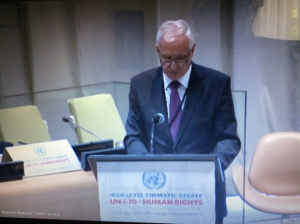
In his remarks, H.E. István Mikola emphasized that intensified global cooperation, international monitoring mechanism, frequent exchange of best practices and enhanced awareness leads to a more peaceful and more stable world where the full enjoyment of human rights is a reality for all.
The Minister of State attended the launch of the End Violence Against Children Global Partership. The partnership is supported by governments, civil society, foundations, private sector and UN agencies.
Joint Statement on the Biological Weapons Convention Review Conference
The following joint statement by the Foreign Ministers of Hungary, the Russian Federation, the United Kingdom and the United States was delivered by Ambassador György Molnar (Hungary) at a plenary session of the United Nations First Committee at UN Headquarters in New York on October 17, 2016. States Parties to the Biological and Toxin Weapons Convention will hold their Eighth Review Conference in Geneva November 7-25, 2016, and Ambassador Molnar will serve as its President.
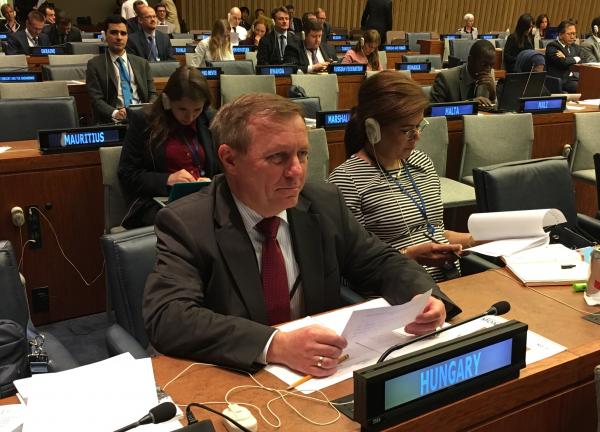
“The Foreign Ministers of Hungary, the Russian Federation, the United Kingdom, and the United States underline the fundamental importance of the Biological and Toxin Weapons Convention as a key pillar of international security and of the pressing need to enhance its effectiveness.
The Foreign Ministers look forward to the Eighth Review Conference of the Convention in November this year agreeing on substantive measures that will significantly strengthen the Convention and contribute in a measurable way to reducing the threat of biological agents being used as weapons.
We are committed to work hard and constructively to this end, and we call upon all States Parties to approach the Conference in a similar spirit and come ready to take the necessary decisions to ensure that the Convention serves its purpose in an effective and sustainable manner.”
In his national capacity, Ambassador Molnár introduced briefly the draft resolution on the BWC. Hungary, following the practice of previous years, after extensive open ended informal consultations has submitted a draft resolution on the Convention on the Prohibition of the Development, Production and Stockpiling of Bacteriological (Biological) and Toxin Weapons and Their Destruction. The goal is to have the resolution adopted by consensus.
EU and first string of its Member States setting the Paris Climate Agreement to enter into force early November
On 5 October, the EU, Austria, France, Germany, Hungary, Malta, Portugal and Slovakia deposited their instruments of ratification of Paris Climate Agreement, thereby triggering its entry into force on 4 November 2016.
The landmark Accord, which commits to limit global temperature rise to well below 2 degrees Celsius, and to strive for 1.5 degrees Celsius, enters into force 30 days after at least 55 countries, accounting for 55 per cent of global greenhouse gas emissions, deposit their instruments of ratification with the Secretary-General.
With the act of deposition by the EU and EU Member States all the requirements for the Agreement’s entry into force are now satisfied, as enough countries have signed onto the landmark accord to bring it to the emissions threshold that will trigger its implementation.
Today, Bolivia, Canada, and Nepal also deposited their instruments of ratification, and earlier this week, New Zealand and India signed onto the Agreement, following the 31 countries which joined at a special event at the UN on 21 September during the UN General Assembly’s general debate. Earlier that month, the world’s two largest emitters, China and the United States, joined the Agreement.
The Agreement will now enter into force in time for the Climate Conference (COP 22) in Morocco in November, where countries will convene the first Meeting of the Parties to the Agreement. Countries that have not yet joined may participate as observers.
Reception to introduce Hungary’s candidature to the Human Rights Council
H.E. Ambassador Katalin Bogyay, Permanent Representative of Hungary to the UN hosted a reception to introduce Hungary’s candidature to the Human Rights Council for the term 2017-2019. The Ambassador confirmed that Hungary believes to have a meaningful contribution to provide to the work of the Human Rights Council, the most important human rights body of the United Nations. She expressed her hope that Hungary can count on the support of UN Member States for this important candidacy at the elections that will take place on 28th October 2016, in the UN General Assembly in New York.
In her keynote address Ambassador Bogyay explained to the audience that one of the cornerstones of Hungary’s foreign policy traditionally lays in commitment to international cooperation aimed at securing peace, welfare and development through promoting effective multilateralism, human rights and fundamental freedoms, including the rights of minorities, democracy and the rule of law.
She mentioned that even though the Council is based in Geneva our Mission in New York also works tirelessly on many human rights related issues:
Hungary participated at the interactive discussion with Human Rights Council candidates, organized by The Permanent Mission of Panama to the UN, Amnesty International and ISHR in July;
Minister of State Dr. István Mikola emphasized at the High-level thematic debate on Human Rights convened by the President of the General Assembly this year in July, that intensified global cooperation, international monitoring mechanism, frequent exchange of best practices and enhanced awareness leads to a more peaceful and more stable world where the full enjoyment of human rights is a reality for all;
At the Conference marking tenth anniversary of the adoption of the Convention on the Rights of Persons with Disabilities, Dr. László Lovászy, Hungary’s candidate to the CRPD Committee was re-elected with great success;
Hungary will continue to be a proactive player in the fight against the various forms of modern slavery, which according to recent estimates affect 45 million women, men and children all over the world. Hungary believes that, member states should provide the political leadership without which this brutal practice cannot be eradicated. Coordination among the relevant UN agencies will also need to be improved and cooperation among the relevant stakeholders should be strengthened;
The Permanent Representative highlighted: Hungary believes that intensified international cooperation, frequent exchange of best practices, international monitoring mechanisms and vigilance can lead to a more peaceful and more stable world which will be able to place human rights aspects in the forefront.
In conclusion she confirmed that Hungary is deeply committed to the strengthening of the international human rights mechanisms and particularly of the work and functioning of the Human Rights Council.
Please find on the right Ambassador Bogyay’s statement as well as the brochure representing Hungary’s activities and priorities regarding human rights and containing the voluntary pledges Hungary made as a candidate to the HRC in line with UNGA resolution A/RES/60/251 in English and French.
World Leaders Call for Action on Water
On 21 September 2016, the High Level Panel on Water (HLPW), co-convened by the Secretary-General of the United Nations and the President of the World Bank Group and consisting of 11 sitting Heads of State and Government and one Special Adviser, called for a fundamental shift in the way the world looks at water that will underpin a more sustainable approach to global development – as outlined in the 17 Sustainable Development Goals, and in particular SDG 6 which focuses on ensuring the availability and sustainable management of water and sanitation for all.
At the meeting of the HLPW, President of Hungary H.E. Mr. János Áder, member of the Panel, underlined that we have about 15 years to turn our water management sustainable before the problem would get out of control in the face of worsening climate change. To solve this looming challenge, we all have to join forces, share the knowledge and give way to water cooperation.
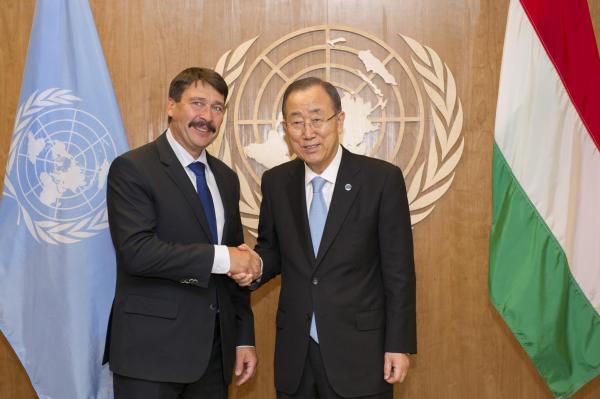
In its Action Plan, issued on 21 September 2016, the HLPW commits itself to take action on water, and calls upon fellow Heads of State and Government, and the world, to do the same with the aim to implement the 2030 Agenda for Sustainable Development.
The HLPW calls on building more resilient societies and economies – including reducing disaster risks – in the face of growing climate variability; on achieving universal access to safe drinking water and sanitation services; enabling cities to have and manage the water they need in an era of rapid urbanization; nurturing water and the environment; and investing in sustainable water infrastructure. We underpin this approach by promoting a strengthened collective governance of water; driving a water data revolution; and recognizing the unique social, economic and environmental value of the water that we have.
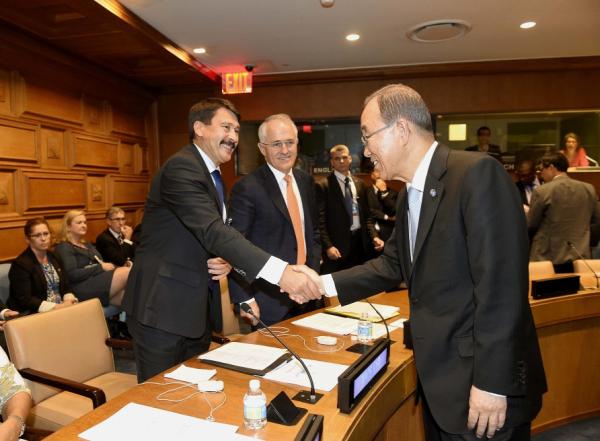
The Panel members also announced four initiatives for immediate action: increasing the attention to water in the climate action plan; stocktaking and calling for recommendations on financing opportunities; making an appeal to existing global networks to launch challenge events; and launching a multi-stakeholder dialogue about the principles and approaches to valuing water.
In a press conference after the meeting of the HLPW, President Áder, o behalf of the Panel, and alongside with the Prime Minister of Bangladesh, the President of South Africa and Special Adviser Dr. Han Seung-soo, Former Prime Minister of the Republic of Korea, briefed the media on the tasks, activities and goals of the HLPW. The President highlighted that the faith of humanity depends on two, closely interlinked challenges, namely on how successfully we tackle the climate change and the water crisis that is looming large in an increasing number of countries across the world. This enormous task puts every country to test, and it is everyone’s responsibility to take action. During the next 20 months the Panel, through its specific initiatives, will call upon all actors to contribute and build on what they are already doing.
During his visit in New York, President János Áder had bilateral meetings with Petro Poroshenko, President of Ukraine, Malcolm Turnbull, Prime Minister of Australia, Jim Yong Kim World Bank Group President and UN Secretary-General Ban Ki-moon. In their meeting, the Secretary-General thanked the President for his leadership role in the High-Level Panel on Water, and expressed his appreciation to the Government of Hungary for being the first EU Member State that finalized its domestic procedures to ratify the Paris Agreement on climate change.
Hungary to put forward six-point proposal at Migration Summit
Minister of Foreign Affairs and Trade Péter Szijjártó headed the Hungarian delegation to the 71st Session of the United Nations General Assembly. In his statements at the Migration Summit and the plenary of the General Assembly, as well as at other events, Mr Szijjártó voiced Hungary's concerns and vision regarding the challanges facing today's Europe.
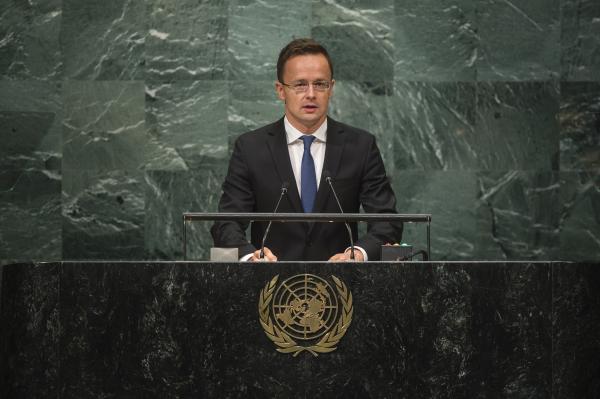
Addressing the world's nations at the migration summit, Mr. Szijjártó said that the worsening situation in Syria indicates that the agreement between the world’s superpowers is not working and the situation in the war-ravaged region is taking another dramatic turn for the worse. This alltogether clearly casts a shadow on the meeting of the international organisation.
“It once again seems a little hopeless that the situation will be put in order and unfortunately Europe will once again bear the brunt of the fact that the situation in Syria remains unsolved, because sorting out the situation in Syria is the prime requisite for solving the immigration crisis. While there is no peace in Syria we must expect newer and newer masses of people to set out towards Europe”, Mr. Szijjártó highlighted. “The fact that the situation has taken a dramatic turn for the worse with the accidental bombing of Syrian government forces and humanitarian convoys means the chance for a solution is once again very far away”, he stressed.
Hungary, which has accumulated significant experience during the migration crisis, put forward six proposals at the migration Summit, added the Hungarian Foreign Minister, according to whom these proposals are important in the interests of enabling not just Europe, but the whole world to solve this global security risk.
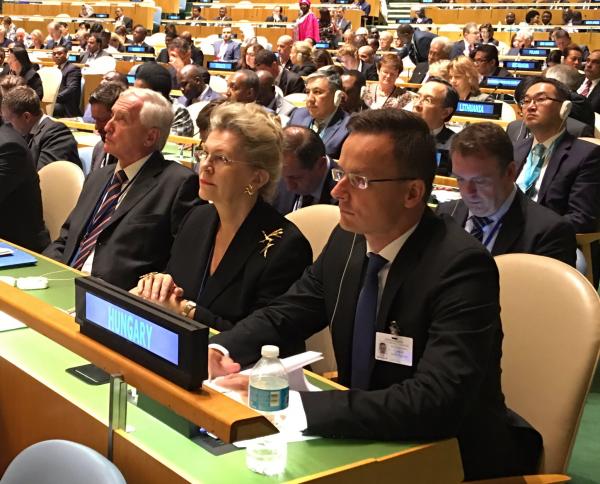
The refugee crisis, diplomatic and economic issues were on the agenda at bilateral talks held by Minister Szijjártó. The Minister took part in several bilateral meetings on the margins of the high-level week, amongst others, with Russian Foreign Minister Sergey Lavrov and President of the General Assembly Peter Thompson. He met with Mr. Amos Hochstein regarding the realisation of Central European energy security. He also met with several of his couterparts from African countries in the interests of expanding economic relations with the continent. During the bilateral meetings the chief diplomat secured votes for Hungary's candidacy to the Human Rights Council.
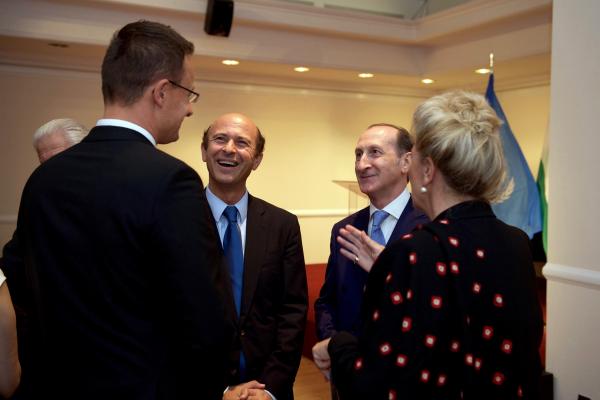
Outside of the walls of the United Nations, the Minister held a talk at the Permanent Mission of Hungary to the UN at an event co-organized by the Foreign Policy Association and the Foreign Press Association (photo album on the right) and had several appearances in the international press and media, including the Wall Street Journal, BBC, CNN and the New York Times. He also held a press conference in front of the press corps accredited to the UN.
The United Nations General Assembly opened its 71st session
The United Nations General Assembly opened its 71st session, as the outgoing Assembly President, Mogens Lyketoff passed the gavel on to the new President, Peter Thomson of Fiji. The session opened with an emphasis on ensuring that implementation of the sustainable development goals, adopted by the UN Member States last year, is well underway. Mr. Thomson, who had had been serving as the Permanent Representative of Fiji to the United Nations until his appointment, said that the theme of the 71st session is ‘The Sustainable Development Goals: A Universal Push to Transform our World.’
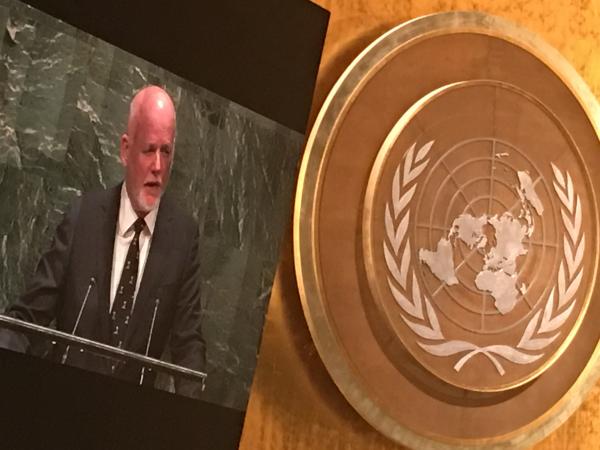
Prior to the opening of the 71st session, the General Assembly held the last meeting of its 70th session, with the outgoing Assembly President, Mogens Lyketoff of Denmark, underscoring the progress made under his leadership, including the adoption of the 2030 Agenda and the Paris Agreement.
The new Assembly President noted that it had been heartening to observe the sincerity with which governments and national planning agencies around the world have begun integrating the 2030 Agenda into national processes. Devoted fully to the sustainability of the fast growing development seen in our world, Hungary is greatly committed to the global implementation of the 2030 Agenda, and the 17 Sustainable Development Goals.
Being a member to the joint UN and World Bank Group High-Level Panel on Water, and hosting the Budapest Water Summit 2016, Hungary considers the achievement of the water related sustainability goals as a cornerstone of the success of the 2030 Agenda.
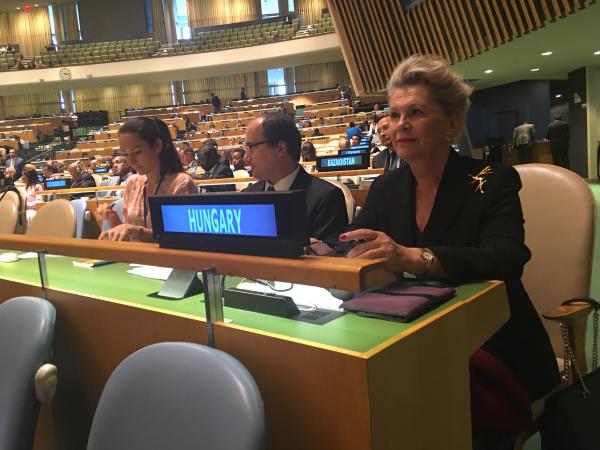
This session will be also special, he flagged – echoing incumbent Secretary-General Ban Ki-moon - in that his office will have the experience of working with two Secretaries-General as the search for the best possible candidate to fill the post is approaching its final stages.
Hungary supports collective efforts to end sexual exploitation and abuse
On 7 September 2016, the President of the UN General Assembly held a meeting in response to recent allegations of sexual exploitation and abuse committed by UN peacekeepers. Ambassador Bogyay, Permanent Representative of Hungary to the United Nations, emphasized at the meeting that Hungary supports the UN’s zero tolerance policy on all forms of sexual exploitation and abuse.
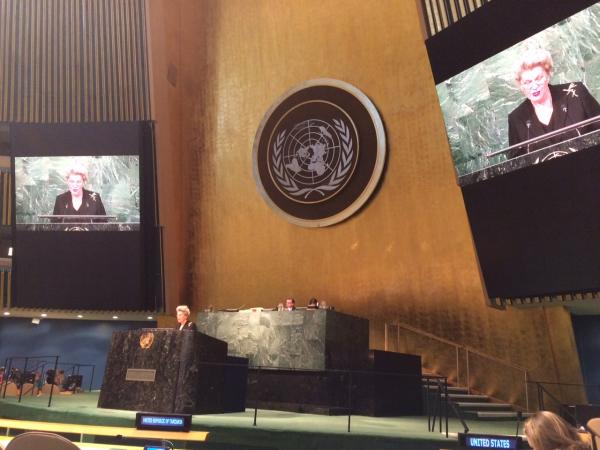
The formal meeting of the General Assembly was initiated by a group of countries who are major troop and police contributors to UN peacekeeping missions. The troop contributing countries highlighted the vital role that UN peacekeepers play in global peace and security. Nevertheless, this reputation is being tarnished by the acts of sexual exploitation and abuse committed by some individuals. The major troop contributing countries therefore propose the adoption of a comprehensive resolution by the UN General Assembly to address this serious issue.
In her statement, Ambassador Bogyay expressed strong concerns about the serious and continuous allegations of sexual exploitation and abuse by United Nations peacekeepers. These acts are unacceptable under any circumstances, and all measures have to be taken against them. Hungary fully supports the United Nations zero tolerance policy on all forms of sexual exploitation and abuse. In order to achieve this goal, the international community must focus on three pillars of actions: prevention, proper investigation of allegations, and accountability of all perpetrators. Ambassador Bogyay added that it is now imperative that the international community lives up to its political commitment by concrete and measurable actions. She finished her statement by commending UN peacekeepers’ efforts to bring peace in conflict areas around the world.
To read the full statement of the Ambassador, please click here.
